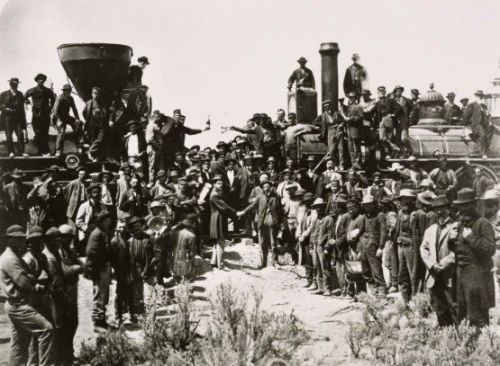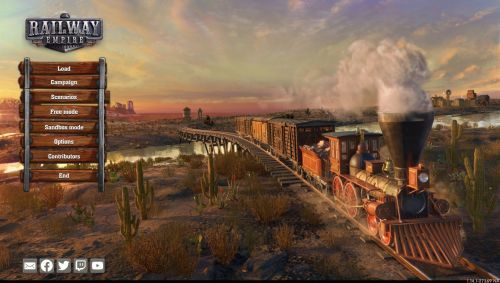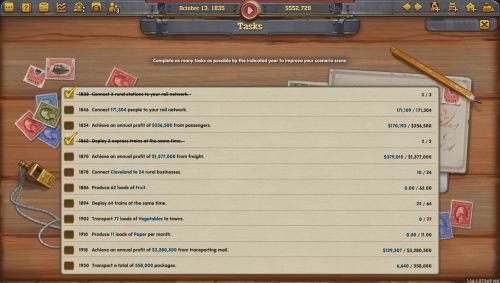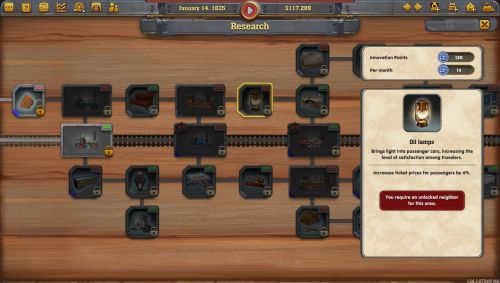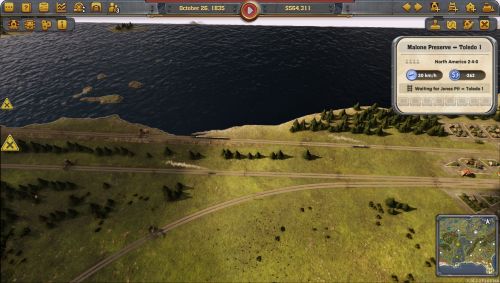[Quickie No. 007] A Look at Railway Empire
[Quickie No. 007] A Look at Railway Empire
Codex Review - posted by Darth Roxor on Sat 16 April 2022, 17:00:36
Tags: Gaming Minds Studios; Kalypso Media; Quickie; Railway Empire; Tacticular CancerChoo choo! I heard you like playing with train sets. I don't know if the same is true for community member Scruffy, but apparently his appreciation for railroading was big enough to write us a Quickie™ of Railway Empire, a lite train baron tycoon kind of game that supposedly isn't even complex enough to be called a simulation kind of game.
If you're only looking for the gist of it:
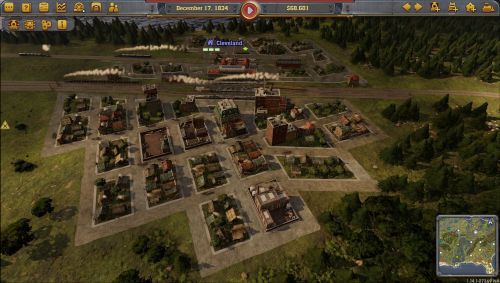
Railway Empire (from now on, R.E.) is a tycoon-type “simulation” game – in quotes, since it doesn’t actually simulate much – where you take up the role of a railroad baron tasked with connecting the East Coast of the United States with the West Coast.
For those of you who have no intention of reading the whole review: if you enjoyed Railroad Tycoon and Sid Meier’s Railroads!, or generally like railroad baron games, or have a thing for the First Transcontinental Railroad, you’re probably going to enjoy this game, for a while. If instead you’re expecting a proper simulation, down to micromanaging stuff, then you will not enjoy R.E., as it will be a bit too simplistic for you.
I, for one, am always grateful when someone gives me the tl;dr right at the start of an article. For those of you with more patience and greater attention spans, you can read the full review here: [Quickie No. 007] A Look at Railway Empire
If you're only looking for the gist of it:

Railway Empire (from now on, R.E.) is a tycoon-type “simulation” game – in quotes, since it doesn’t actually simulate much – where you take up the role of a railroad baron tasked with connecting the East Coast of the United States with the West Coast.
For those of you who have no intention of reading the whole review: if you enjoyed Railroad Tycoon and Sid Meier’s Railroads!, or generally like railroad baron games, or have a thing for the First Transcontinental Railroad, you’re probably going to enjoy this game, for a while. If instead you’re expecting a proper simulation, down to micromanaging stuff, then you will not enjoy R.E., as it will be a bit too simplistic for you.
I, for one, am always grateful when someone gives me the tl;dr right at the start of an article. For those of you with more patience and greater attention spans, you can read the full review here: [Quickie No. 007] A Look at Railway Empire
[Review by Scruffy]
Railway Empire
At some point in the 1600s, a group of Puritans came to the conclusion that their worldview was right, and everyone else’s was wrong. They notified the Church of England of this oversight, and kindly offered to set everything straight, but the English government was not convinced.
The Puritans then decided to move to the Netherlands, but, being English, they knew no other language and had no intention of learning any, so that attempt failed.
Finally, the epiphany: they would move to the New World, and establish their own colony. In Railway Empire you follow in the footsteps of these pioneers and help bring civilization further west, through the same superior technology used to genocide the locals, by building the First Transcontinental Railroad.
Railway Empire (from now on, R.E.) is a tycoon-type “simulation” game – in quotes, since it doesn’t actually simulate much – where you take up the role of a railroad baron tasked with connecting the East Coast of the United States with the West Coast.
For those of you who have no intention of reading the whole review: if you enjoyed Railroad Tycoon and Sid Meier’s Railroads!, or generally like railroad baron games, or have a thing for the First Transcontinental Railroad, you’re probably going to enjoy this game, for a while. If instead you’re expecting a proper simulation, down to micromanaging stuff, then you will not enjoy R.E., as it will be a bit too simplistic for you.
The game starts with a forgettable intro sequence, where the camera points at a crappy town that becomes slightly less crappy with the passage of time, while trains keep coming and going. Then, the camera follows a train inside a tunnel.
Now, if I’m playing with a pretend model train, the least I expect is for everything to be epic. Even simply having the train come out of the tunnel and showing a view of a bustling San Francisco, with the Golden Gate bridge, would have helped selling the idea that you’re embarking on an epic journey to bring civilization to the West Coast.
Your objection might be: “but Scruffy, the First Transcontinental Railroad was built in the late 1800s, and the Golden Gate bridge was built in the 1930s!” Remember how I said this game wasn’t exactly a simulation? Well, it uses the Whyte notation system for locomotives, as well as time-accurate depictions of the trains themselves, down to the nicknames they were given. And at the same time, you have women railway owners. So if you’re going full science fiction, you might as well put the Golden Gate bridge out there to make the game feel more epic.
After the intro, you’re greeted by the starting menu. The user interface in general is clean and does its job well, although it is at times a bit unclear inside the game itself. The available options are “Campaign”, where you’re the guy in charge of building the Transcontinental Railroad while beating your competition, “Scenarios”, where you play the same scenarios as in the campaign, but you can choose between various characters with bonuses/maluses different than the main campaign character, “Free Mode”, where your objectives are random and you don’t need to complete them, and lastly a “Sandbox Mode”, where you have no objectives, no competition and infinite money, and can do anything to your heart’s desire, like trying to see what builds work best, etc.
In “Campaign” mode, you have diverse tasks that do not necessarily require you to become the most efficient, rich or best-developed railway owner. In “Scenario” mode, however, the meat of the game will eventually be always the same: start off by expanding as fast as possible to stop your competition from building in too many cities, and then wait until you have enough money and research points to improve your stations and trains.
That is the main problem of the game: once you have solved the puzzle of how to optimize your starting conditions, everything boils down to waiting. Waiting means accumulating money and research points. So you can research new locomotives and then buy them. Unfortunately, that’s pretty much it. Eventually, you make more money than you know what to do with, and you’ll buy out the competition. This makes R.E. a fun game, until you figure out how to solve the puzzle. After that, the challenge turns into trying to figure out even more optimized paths, which some might enjoy for a while.
I’m sure that a sizable part of the Codex userbase has replayed the same section of a videogame hundreds of times to shave off a couple milliseconds. It’s the same kind of people who become distressed when you talk to them, or who start screeching when you inform them that Disco Elysium is, in fact, not that good, but for your normal human, repeating the same build for the twentieth time, but this time bending the tracks slightly more to the right so building them saves you 3 dollars, might not be the idea of fun.
The research part of the game doesn’t have much depth either. Sure, you CAN research “Sell your used locomotives at a better price”, but with money becoming meaningless, you have no incentive to research that. You will research faster locomotives, more reliable locomotives that don’t break down as often, and the only “strategy” involved will be the optimal path to reach a new locomotive as fast as possible. And on the next map or the next playthrough, you’ll be given no incentive to play any differently.
Raising the difficulty doesn’t do it either, because all that does is making the competition start off with a substantially higher amount of money than you. Which, in turn, means that you have to wait more time for your system to generate enough money to eventually buy them out. R.E. really works better as a puzzle game than a tycoon: the satisfaction comes from seeing all the parts of your organization work like clockwork, after spending hours trying to figure out why all those trains are getting tangled up in the same station.
Switching and signaling adds a fun layer to the overall puzzle, and it allows for relatively complex systems to be set up. A single main track can bifurcate, trifurcate and so on, easing the traffic and increasing the number of trains on the same line with a minimal investment.
You can buy different types of manufacturing industries too: breweries, furniture makers, etc. It's really just another way to make money – you save up now to buy an industry to have more cash in the long run. You can upgrade said industries to make them even more profitable as well. Again, there isn't much strategy involved, it simply always makes sense to buy them, because they are always profitable as long as you keep the raw materials coming, and there’s never any particular problem that would arise to make it difficult to obtain these materials.
You can add personnel to your trains, such as stokers, conductors, engineers, security guards: they make your trains go faster, break down less, etc. You can also hire freelancers for one-off jobs – journalists to write hit pieces against your competition, criers to get more people to board your trains, bandits, market raiders, and so on. Again, this always translates into spending money to make more money, essentially.
Lastly, there's a stock market sub-section, where you can try to make more money by manipulating the amounts of things like raw materials in circulation. It's not worth it though, since any amount made is insignificant compared to what you make through your railway system and companies.
R.E. also has a bunch of expansions. I only played the Mexico one, and it was more of the same, only on different maps.
It might sound like I’m shitting on R.E., so let me clarify: this game is clearly a labor of love. The graphics are great, the ambiance and music are spot-on, and the ability to ride the trains is fantastic, you feel really proud when you arrive at a station in a big city that used to be little more than a village, all thanks to you building a station and connecting the local farms and mines to the railroad. The atmosphere is perfect, the locomotives are true to reality and the scenery is American Old West through and through. If what you want is a satisfying puzzle game that will keep you entertained until you figure out the puzzles, R.E. is great. It’s beautiful, relaxing and quaint.
If what you want is a managerial simulation where it matters who you hire, what upgrades you research and how you manage your money, then this is not it.
Railway Empire is a great game if you belong to the niche it’s addressed to, just do not make the mistake of thinking that this niche includes people looking for a railroad tycoon game. The target audience for Railway Empire is people who love train sets, who enjoy playing with model trains and fantasize about traveling during the Gilded Age. If you belong to that niche, then you’ve found your game, and it will give you hours of fun.
Railway Empire
At some point in the 1600s, a group of Puritans came to the conclusion that their worldview was right, and everyone else’s was wrong. They notified the Church of England of this oversight, and kindly offered to set everything straight, but the English government was not convinced.
The Puritans then decided to move to the Netherlands, but, being English, they knew no other language and had no intention of learning any, so that attempt failed.
Finally, the epiphany: they would move to the New World, and establish their own colony. In Railway Empire you follow in the footsteps of these pioneers and help bring civilization further west, through the same superior technology used to genocide the locals, by building the First Transcontinental Railroad.
Railway Empire (from now on, R.E.) is a tycoon-type “simulation” game – in quotes, since it doesn’t actually simulate much – where you take up the role of a railroad baron tasked with connecting the East Coast of the United States with the West Coast.
For those of you who have no intention of reading the whole review: if you enjoyed Railroad Tycoon and Sid Meier’s Railroads!, or generally like railroad baron games, or have a thing for the First Transcontinental Railroad, you’re probably going to enjoy this game, for a while. If instead you’re expecting a proper simulation, down to micromanaging stuff, then you will not enjoy R.E., as it will be a bit too simplistic for you.
The game starts with a forgettable intro sequence, where the camera points at a crappy town that becomes slightly less crappy with the passage of time, while trains keep coming and going. Then, the camera follows a train inside a tunnel.
Now, if I’m playing with a pretend model train, the least I expect is for everything to be epic. Even simply having the train come out of the tunnel and showing a view of a bustling San Francisco, with the Golden Gate bridge, would have helped selling the idea that you’re embarking on an epic journey to bring civilization to the West Coast.
Your objection might be: “but Scruffy, the First Transcontinental Railroad was built in the late 1800s, and the Golden Gate bridge was built in the 1930s!” Remember how I said this game wasn’t exactly a simulation? Well, it uses the Whyte notation system for locomotives, as well as time-accurate depictions of the trains themselves, down to the nicknames they were given. And at the same time, you have women railway owners. So if you’re going full science fiction, you might as well put the Golden Gate bridge out there to make the game feel more epic.
After the intro, you’re greeted by the starting menu. The user interface in general is clean and does its job well, although it is at times a bit unclear inside the game itself. The available options are “Campaign”, where you’re the guy in charge of building the Transcontinental Railroad while beating your competition, “Scenarios”, where you play the same scenarios as in the campaign, but you can choose between various characters with bonuses/maluses different than the main campaign character, “Free Mode”, where your objectives are random and you don’t need to complete them, and lastly a “Sandbox Mode”, where you have no objectives, no competition and infinite money, and can do anything to your heart’s desire, like trying to see what builds work best, etc.
In “Campaign” mode, you have diverse tasks that do not necessarily require you to become the most efficient, rich or best-developed railway owner. In “Scenario” mode, however, the meat of the game will eventually be always the same: start off by expanding as fast as possible to stop your competition from building in too many cities, and then wait until you have enough money and research points to improve your stations and trains.
That is the main problem of the game: once you have solved the puzzle of how to optimize your starting conditions, everything boils down to waiting. Waiting means accumulating money and research points. So you can research new locomotives and then buy them. Unfortunately, that’s pretty much it. Eventually, you make more money than you know what to do with, and you’ll buy out the competition. This makes R.E. a fun game, until you figure out how to solve the puzzle. After that, the challenge turns into trying to figure out even more optimized paths, which some might enjoy for a while.
I’m sure that a sizable part of the Codex userbase has replayed the same section of a videogame hundreds of times to shave off a couple milliseconds. It’s the same kind of people who become distressed when you talk to them, or who start screeching when you inform them that Disco Elysium is, in fact, not that good, but for your normal human, repeating the same build for the twentieth time, but this time bending the tracks slightly more to the right so building them saves you 3 dollars, might not be the idea of fun.
The research part of the game doesn’t have much depth either. Sure, you CAN research “Sell your used locomotives at a better price”, but with money becoming meaningless, you have no incentive to research that. You will research faster locomotives, more reliable locomotives that don’t break down as often, and the only “strategy” involved will be the optimal path to reach a new locomotive as fast as possible. And on the next map or the next playthrough, you’ll be given no incentive to play any differently.
Raising the difficulty doesn’t do it either, because all that does is making the competition start off with a substantially higher amount of money than you. Which, in turn, means that you have to wait more time for your system to generate enough money to eventually buy them out. R.E. really works better as a puzzle game than a tycoon: the satisfaction comes from seeing all the parts of your organization work like clockwork, after spending hours trying to figure out why all those trains are getting tangled up in the same station.
Switching and signaling adds a fun layer to the overall puzzle, and it allows for relatively complex systems to be set up. A single main track can bifurcate, trifurcate and so on, easing the traffic and increasing the number of trains on the same line with a minimal investment.
You can buy different types of manufacturing industries too: breweries, furniture makers, etc. It's really just another way to make money – you save up now to buy an industry to have more cash in the long run. You can upgrade said industries to make them even more profitable as well. Again, there isn't much strategy involved, it simply always makes sense to buy them, because they are always profitable as long as you keep the raw materials coming, and there’s never any particular problem that would arise to make it difficult to obtain these materials.
You can add personnel to your trains, such as stokers, conductors, engineers, security guards: they make your trains go faster, break down less, etc. You can also hire freelancers for one-off jobs – journalists to write hit pieces against your competition, criers to get more people to board your trains, bandits, market raiders, and so on. Again, this always translates into spending money to make more money, essentially.
Lastly, there's a stock market sub-section, where you can try to make more money by manipulating the amounts of things like raw materials in circulation. It's not worth it though, since any amount made is insignificant compared to what you make through your railway system and companies.
R.E. also has a bunch of expansions. I only played the Mexico one, and it was more of the same, only on different maps.
It might sound like I’m shitting on R.E., so let me clarify: this game is clearly a labor of love. The graphics are great, the ambiance and music are spot-on, and the ability to ride the trains is fantastic, you feel really proud when you arrive at a station in a big city that used to be little more than a village, all thanks to you building a station and connecting the local farms and mines to the railroad. The atmosphere is perfect, the locomotives are true to reality and the scenery is American Old West through and through. If what you want is a satisfying puzzle game that will keep you entertained until you figure out the puzzles, R.E. is great. It’s beautiful, relaxing and quaint.
If what you want is a managerial simulation where it matters who you hire, what upgrades you research and how you manage your money, then this is not it.
Railway Empire is a great game if you belong to the niche it’s addressed to, just do not make the mistake of thinking that this niche includes people looking for a railroad tycoon game. The target audience for Railway Empire is people who love train sets, who enjoy playing with model trains and fantasize about traveling during the Gilded Age. If you belong to that niche, then you’ve found your game, and it will give you hours of fun.
There are 27 comments on [Quickie No. 007] A Look at Railway Empire





